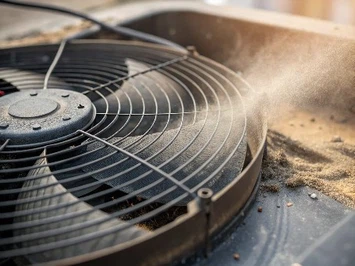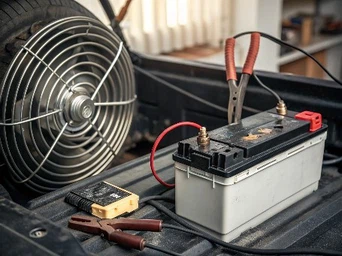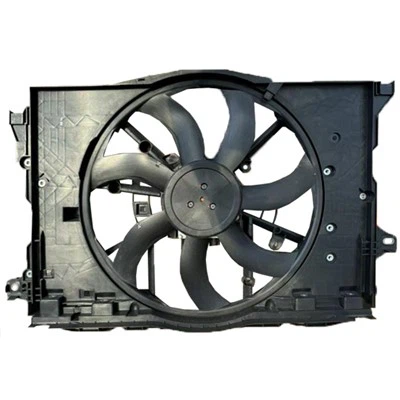Why does my radiator fan sound so loud?
Loud radiator fan noise can be surprising and annoying. Why is your fan suddenly making so much noise?
A loud radiator fan usually means the fan motor or blades have wear or damage, or the fan is running at full speed due to high engine temperature. Debris or loose parts can also cause extra noise.

Let's find out what causes that noise and how to solve it.
Why doesn't my car's radiator fan turn off properly despite working when it turns on?
It can be strange when the fan starts and never stops. Why does the radiator fan work then fail to turn off?
If your radiator fan won't turn off, it often means the temperature sensor or fan relay is failing, or the engine is running hotter than normal, causing the fan to keep running for safety.

The radiator fan control depends on feedback from temperature sensors, often the coolant temperature sensor or dedicated fan switch. When the engine gets hot, it signals the fan to turn on. When the engine cools, it signals the fan to turn off.
If your fan stays on, possible reasons include:
Faulty temperature sensor: Sending false high temperature readings.
Stuck fan relay: Causes the fan motor power circuit to stay closed.
Engine overheating: Cooling system issues like low coolant or clogged radiator keep engine hot.
After-run function: Some cars run the fan for a short time after engine shutdown to prevent heat soak.
Diagnosing requires testing sensors and relays with a multimeter, and checking coolant levels and radiator condition.
Here's a quick table of causes and how to check:
| Symptom | Possible Cause | How to Test |
|---|---|---|
| Fan runs constantly when hot | Faulty sensor or relay | Check sensor output, relay control voltage |
| Fan runs after engine off | Normal after-run function or relay stuck | Observe if fan stops after cooling or check relay |
| Fan never stops | Wiring short or relay stuck | Inspect wiring for shorts, test relay |
Why do my car's cooling fans keep running and killing the battery when the car is off?
Fans running while your car is off drains the battery fast. Why do cooling fans keep running and kill your battery?
If cooling fans keep running after shutdown and kill the battery, it usually means a stuck relay, faulty temperature sensor, or electrical short that prevents the fan circuit from turning off.

Electric radiator fans rely on the vehicle's electrical system and control modules. When the engine is off, the fan should not receive power.
Continued fan operation after shutdown indicates a problem in the control circuit. Common causes are:
Stuck fan relay: When a relay gets stuck closed, it continuously sends power to the fan motor.
Faulty temperature sensor: If it falsely reports a hot engine, the system keeps the fan running.
Control module error: The engine control module may fail to cut power to the fan.
Wiring short circuit: Damaged wires can create unintended paths, keeping the fan powered.
Repeated battery drain can damage the battery and leave you stranded. Repair means checking and replacing relays, sensors, or repairing wiring.
Here's a checklist to diagnose:
| Problem | Cause | Solution |
|---|---|---|
| Fan runs after off | Stuck relay | Replace relay |
| Faulty sensor | Replace temperature sensor | |
| Faulty control module | Repair or reprogram ECU | |
| Wiring short | Find and fix wiring |
What is the difference between radiator fan of car, moto and truck?
Is every fan the same, regardless of vehicle? What are the differences in radiator fans for cars, motorcycles, and trucks?
Radiator fans differ in size, power, and design to match vehicle cooling needs. Trucks have larger, more robust fans; motorcycles use smaller, more compact fans; cars fall in between with electric or mechanical types suited to engine size.

Cooling needs vary with engine size, vehicle weight, and space constraints. As a result, radiator fans adapt in several ways:
| Vehicle Type | Fan Size & Power | Fan Type | Mounting & Design | Cooling Requirements |
|---|---|---|---|---|
| Car | Medium-sized | Electric or mechanical | Mounted behind radiator, shrouded for air direction | Moderate heat removal, varied driving conditions |
| Motorcycle | Small, compact | Mostly electric | Integrated close to radiator with space limits | Compact cooling, lighter airflow requirements |
| Truck | Large, heavy-duty | Mostly electric, sometimes mechanical with clutch | Larger fans, sometimes multiple fans, rugged design | High heat loads from bigger engines and loads |
Motorcycles prioritize space and weight savings, so fans and radiators are compact. Their engines run hotter due to smaller radiators, so fans may spin faster.
Trucks have greater cooling demands with large engines and heavy loads. They use bigger or multiple fans that can move huge volumes of air. Durability and ease of maintenance are also key factors.
Cars balance between performance and efficiency, hence a variety of fan types and sizes. Electric fans dominate modern cars for improved control and fuel savings.
Understanding these differences helps when replacing or upgrading fans to the correct specification.
Conclusion
Radiator fan noise, constant running, and battery drain usually signal faults in sensors, relays, or wiring. Radiator fans vary between vehicle types depending on their cooling demands and design needs.






